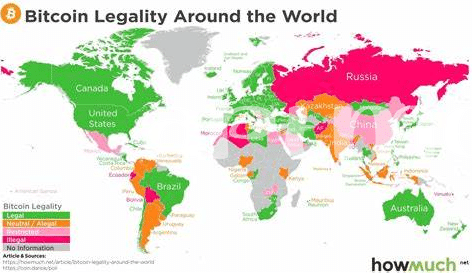Government Regulations 🚫

Navigating the realm of Bitcoin in a country with stringent government regulations can feel like sailing through turbulent waters. Constantly changing rules and restrictions pose significant challenges for users wanting to engage in cryptocurrency transactions. The unpredictability of regulatory actions adds an extra layer of complexity, causing uncertainty and hesitation among individuals looking to use Bitcoin in a controlled environment. This regulatory landscape can lead to difficulties in accessing platforms and services necessary for seamless transactions, ultimately hindering the full potential of Bitcoin in the country.
Lack of Infrastructure 💻
Lack of adequate infrastructure poses a significant challenge for Bitcoin users in restricted countries. The lack of robust internet connectivity and technological resources hinders the seamless adoption and utilization of this digital currency. Without a reliable infrastructure in place, individuals face difficulties in accessing and engaging with Bitcoin transactions, limiting its potential impact and usage within these regions.
Furthermore, the absence of suitable platforms and tools for securely storing and managing Bitcoin adds to the obstacles faced by users. The reliance on unstable or outdated systems can result in inefficiencies and vulnerabilities, impacting the overall user experience and raising concerns about the long-term sustainability of Bitcoin usage in restricted nations.
Security Concerns 🔒

In restricted countries, the use of Bitcoin can pose significant challenges due to security concerns. With the decentralized nature of Bitcoin transactions, there is an increased risk of hacking and fraud, making it crucial for users to adopt stringent security measures to safeguard their digital assets. The anonymity associated with Bitcoin transactions also opens up opportunities for illicit activities, raising concerns for both users and regulatory bodies. Additionally, the lack of consumer protection mechanisms in the decentralized Bitcoin network further exacerbates security vulnerabilities, making it a risky choice for individuals operating in restricted environments. Implementing robust encryption practices and staying informed about the latest security threats are essential steps in mitigating these risks and ensuring a safer Bitcoin experience.
Limited Acceptance 🛒

When it comes to the challenges of using Bitcoin in a restricted country, one significant issue faced by users is the limited acceptance of this digital currency. Many businesses and merchants may not yet recognize or support Bitcoin payments, making it challenging for individuals to utilize it for their transactions. This lack of widespread acceptance can hinder the adoption and mainstream use of Bitcoin within these regions. To learn more about the legal aspects of Bitcoin in Nigeria and how users navigate such restrictions, you can explore the article on is bitcoin legal in Nigeria?.
Fluctuating Value 💰
Bitcoin’s value can see rapid and unpredictable changes, which presents a significant challenge to users in restricted countries. These fluctuations make it difficult for individuals and businesses to accurately assess the value of their holdings and plan for financial transactions. The uncertainty surrounding Bitcoin’s value can deter potential users from adopting it for everyday transactions or long-term investment. Additionally, the lack of stability in its value can lead to potential losses for those relying on Bitcoin for financial transactions, making it a risky endeavor in countries with strict regulations on digital currencies.
Risk of Penalties ☠️

When using Bitcoin in a restricted country, individuals face the looming threat of severe penalties should they be caught engaging in cryptocurrency transactions. The potential consequences can range from hefty fines to imprisonment, depending on the specific regulations of the country in question. This risk of penalties adds a layer of fear and uncertainty for those attempting to navigate the complex landscape of using Bitcoin within a restrictive environment.
To explore more about the legality of Bitcoin in different countries, you can check if is Bitcoin legal in Niger?
